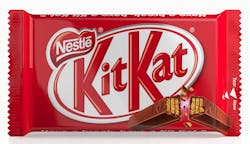Europe’s consumer-goods giants are showing new signs of life by selling more food and cleaning supplies, even at higher prices.
Nestle SA and Unilever surprised investors with strong starts to the year, reporting first-quarter sales growth that handily topped analysts’ estimates. The Swiss maker of KitKat bars and the Anglo-Dutch owner of Dove soap each cited a combination of improved pricing and higher volumes.
Unilever rose as much as 4.2% in Amsterdam as Nestle traded as much as 1.4% higher in Zurich.
The companies delivered a counterpoint to the cost-cut-driven performance of U.S. rival Kraft Heinz Co., which has slumped since a profit warning and asset writedown in February -- about two years after it made an unsuccessful approach to take over Unilever. Instead, the European multinationals joined U.S. peers like PepsiCo Inc. in selling more of their products. The companies also successfully passed higher raw-materials costs on to consumers.
At Nestle, for example, the pricing gain of 1.2% was the biggest in 10 quarters. The businesses most hit by inflation included bottled water, with higher oil prices making plastic and transport more expensive. Unilever also noted higher costs of petrochemicals such as linear alkylbenzene, an ingredient in biodegradable detergents, along with increased prices for raw materials in the food sector.
Nestle forecast that headwinds from commodity costs will increase in the second half. Chief Executive Officer Mark Schneider said the company sees more growth for many brands in the high end.
Nescafe, for example, has faced pressure on market share in Europe from cheaper competition, and so Nestle is adding reformulated versions that it can charge more for. The same goes for the company’s mass-market water brands, such as Pure Life, leading Nestle to withdraw from markets like Brazil. In North America, Nestle plans to emphasize its more expensive international brands like Perrier and Acqua Panna.
“There’s no point in trying to out-compete private label and chase unprofitable growth,” Schneider said on a call with analysts. “We’re not trying to be the leader when it comes to going south on pricing.”
On Wednesday, Danone SA forecast milk-price inflation in high single digits this year, plus more expensive sugar and fruit. Other commodities such as cocoa and coffee have fallen.
“What companies like ourselves face is the impact of the input-costs increases and commodity-driven gains on the ground,” Unilever Chief Financial Officer Graeme Pitkethly said by phone. PepsiCo CFO Hugh Johnston said earlier this week that the drinks and snacks giant expects commodity inflation to increase over the rest of the year.
While Europe and Japan are suffering from stubbornly low price increases or even deflation, higher rates of inflation are popping up in places like Turkey and Argentina. Moroccan consumers have held an informal boycott of Danone products via social media over the past year to protest what consumers see as unfair prices.
While managing to raise prices, Nestle and Unilever also benefited by expanding into new areas as their old-line brands stagnate. Sales in Unilever’s home-care division, which grew at about twice the pace of the group figure, were driven in part by more eco-conscious products under the company’s Seventh Generation and Omo laundry brands. Acquisitions the Anglo-Dutch company has made since 2015 collectively grew at a double-digit rate in the quarter.
Nestle CEO Schneider signed $14 billion of deals in 2018. The food giant has also been trying to fix or sell underperformers, with a sale for its Herta lunch-meat unit possibly coming by midyear and its dermatological business by year-end.
Beating Estimates
Nestle’s revenue climbed 3.4% on an organic basis in the first quarter, as Schneider beat the 2.8 percent analyst consensus by the biggest margin since he started leading the world’s largest food company in 2017.
At Unilever, underlying sales rose 3.1% in the quarter. As with Nestle, analysts had expected 2.8 percent.
About the Author
Bloomberg
Licensed content from Bloomberg, copyright 2016.
